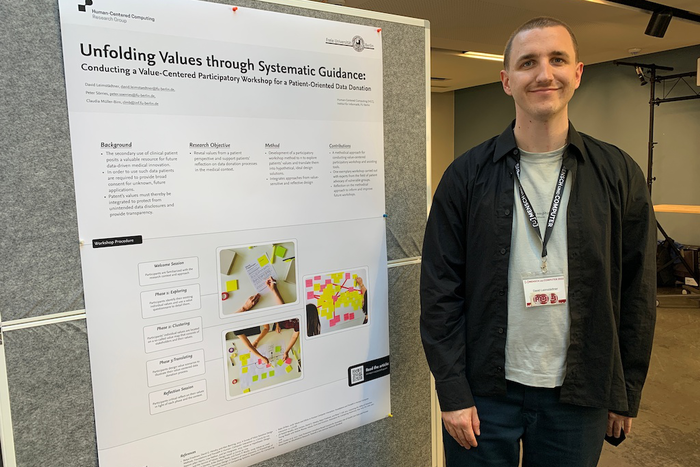Interview with David Leimstädtner
David Leimstädtner at the Mensch und Computer (MuC) Conference in Darmstadt in September 2022
Image Credit: Mario Cypko
David Leimstädtner is a research associate in the project WerteRadar that explores sovereign data donation. In this interview he shares his view on interdisciplinary perspectives at HCC.
David, you have been a research associate in the Human-Centered Computing research group for almost a year now. What makes research and work at HCC special for you?For me, research in the field of Human-Computer Interaction refers to an investigation of the relationship between humans and technology. However, this relationship extends beyond the very moment of interaction, and requires that we also consider the societal issues that accompany or are affected by the use of technology. Such an understanding of HCI, which goes far beyond an engineering perspective, permeates all activities of the HCC research group. What I also find very exciting about the work at the HCC research group is the interdisciplinarity that I experience here. A wide variety of academic backgrounds, from computer science and data science to psychology, design, and cultural studies, inform different perspectives on the research topics that we investigate. This results in research that transcends academic 'bubbles' and sometimes even challenges entrenched paradigms from the individual disciplines. This is, of course, also challenging, but even more so it is extremely exciting, productive and rewarding!
You just mentioned the different academic backgrounds that come together at HCC - where would you situate yourself?I completed my Bachelor's degree in »Social and Business Communication« at the Berlin University of the Arts, as well as a »Research Master Communication Science« at the University of Amsterdam. While for the bachelor's degree I primarily explored subcultures and trend developments from a cultural studies perspective, for the master's degree I was mainly focused on experimental research using methods and research approaches from the so-called »Computational Social Science«. In addition, I worked as a UX consultant for a large Berlin-based agency and designed concepts for e-government applications - so the building blocks for my move into HCI research have been in place for some time and are now coming together in my work at HCC.
Can you give us an example of how these different perspectives that you've described as part of the interdisciplinary perspectives at HCC are integrated in your current research?The different disciplinary backgrounds also imply a diversity in terms of methodological approaches and perspectives, which are applied in our research to current, socially relevant issues. In the WerteRadar project, in which I am currently involved, we combine qualitative approaches, such as conducting participatory workshops with patients at Charité Berlin, with quantitative approaches, such as conducting online crowdsourcing experiments. At the same time, the project WerteRadar is set up as an interdisciplinary cooperation between computer science, media education and medicine, which allows us to integrate important and relevant contextualizations in our research. The results of these mixed methods approaches ultimately all inform the overall goal of the research project: to design an interface that enables patients to make sovereign and informed decisions about donating their data.
Interview & Text: David Leimstädtner and Katrin Glinka



